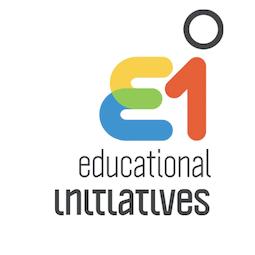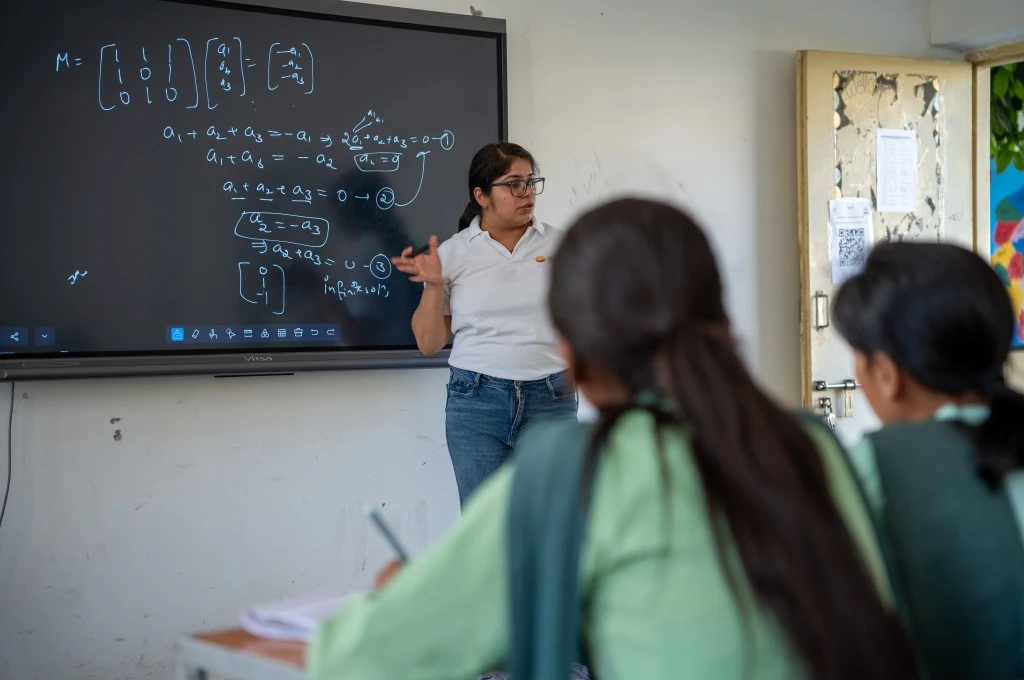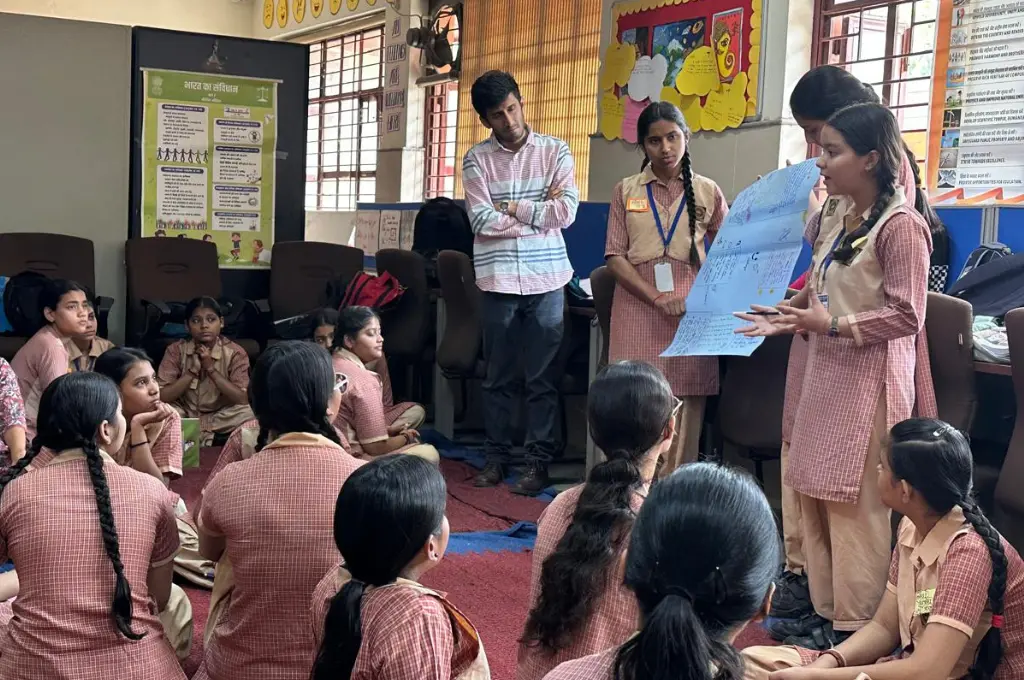Parth Shah, Founder President of Centre for Civil Society in conversation with Pranav Kothari, Vice President of Large Scale Education Programs at Educational Initiatives.
Parth Shah is founder president of the Centre for Civil Society (CCS). CCS advances social change through public policy. Their work in education, livelihood, and policy training promotes choice and accountability across the private and public sectors. To translate policy into practice, CCS engages with policy and opinion leaders through research, pilot projects and advocacy.
Parth taught economics at the University of Michigan before returning to India to start CCS. His research and advocacy focuses on the themes of economic freedom, choice and competition in education, property rights approach for the environment and good governance. He holds a PhD in Economics from Auburn University.
Here are some key insights from the conversation:
“In India I think it’s very hard to describe the exact process of policy making. Because policies are made in many different ways. For example, let’s take the Right to Information Act (RTI). RTI was made in a very different way than many other Acts. It came from civil society… civil society kept pressure on the government to do something about transparency and accountability in terms of what government does. The ‘humara paisa humara hisaab’ slogan created by civil society worked very well. That’s one model of how policy gets made.”
“In my view, one certainly was the ‘No Detention’ clause, for more than one reason. I think it was one of the most positive aspects of RTE. And the second is the 25 percent seats to be kept in private schools for economic and socially weaker students… section 12 (1)(c). I think it creates a space for more inclusive education. My only objection is that it isn’t given enough thinking in terms of the implementation. It’s a great idea but rather badly implemented as of today.”
“The most recent change that has happened in the RTE Act is about amending it to allow students to be detained in the classroom up to grade 8. Earlier, RTE prohibited any detention. Every child had to be promoted every year to the next grade. And now the amendment allows schools to withhold them.”
“I’m quite opposed to this change. In my view, RTE had only one clause which indirectly talked about learning outcomes. This was the ‘No Detention’ clause. Schools would have to achieve learning outcomes. That was the only accountability mechanism in RTE. And that’s the first thing that was removed from the law.”
Recommendations for RTE
“Firstly, keep the focus on learning outcomes. At the end of the day, the schools exist, the teachers exist, the investment goes in there because you want to make sure that kids are able to do what they are expected to do at a given age.”
“Every state was supposed to draft rules under the RTE Act. Gujarat drafted those rules like every other state, and they do two things. One is to focus on learning outcomes. So, 85 percent overall weightage is given to learning outcomes. Secondly, there are two components–how you are performing absolutely, compared to other schools; but equally importantly, how have you improved from where you were last year.”
“The law says all schools must meet minimum requirements about say, the number of toilet facilities for girls and boys, drinking water facility, classroom size, library books. Now all those laws are enforced only on private schools. This has created a very vitiated environment in the sector. It has become–despite all the efforts of many people–government versus private.”
“Regulators should be separate, and apply the rules and regulations to all schools, including government schools. And a separate group of people within the department should be in-charge of running the schools and therefore they can also be held to account for the performance of those schools.”
“Thirdly, enable schools to compete on an equal footing. One idea there is to fund students not schools.”
“Today we have private schools where you have fee-paying students and 25 percent who are being paid for by the government. We need to build a system where the same thing happens in government schools. My idea is that you should not have a system which only targets one set of students or children in the society. Today, government schools are about only one set of children. That whole mindset breeds complacency. The budget is approved by the Education Department which is going to continue to come. They can’t close down the schools, can’t fire teachers. There are enough poor parents who will keep coming to my school. They can’t go anywhere else. So there is a captive audience. If there is nothing to hold me to account, there’s no pressure to improve, no pressure to think about the kids who are coming to my school–what are their challenges, how can I meet those challenges, right? All of that deeper thinking and engagement has to happen. I don’t see the incentive for the system to do it systematically. So, I want to fund students, not schools, where some students are paying fees and some are being paid for by the government. That, ultimately, is the final sort of tier of accountability.”
“It’s a great question and I agree that I don’t really have a very good answer. In my understanding we don’t have an answer to that question in a systemic way. We have some data, some evidence, to give you some clues about it. If you think about democracy, we allow every person to vote. We don’t ask how educated you are. We don’t ask how wealthy you are. We don’t ask if you studied all the party manifestos to decide whom to vote for. We’ve just given them the power to vote. So, democracy in a sense functions on the assumption that at least as a group of people, if not individually, each one of us would make the right choices. We have to apply the same principle in many other parts of our life. In particular, in areas like education, people should have the power to make those choices. Yes, they may make bad choices. But I would not want to start with the assumption that only if I have a guarantee that you will make the right choice, will I give you the power to make a choice.”
“I suggest that wherever there are possibilities to help parents to make better choices, that’s where we should focus, rather than on whether parents should have a choice or not. For example, Bihar’s bicycle scheme was run by Nitish Kumar in his first term as Chief Minister. For the first time in India’s history, we didn’t give people bicycles, we gave them money to buy a bicycle. Many researchers did research on what actually happened. And we know from the research overall that almost 90 percent of the parents bought a bicycle. I don’t know any scheme in India’s history that has had a 90 percent success rate. Nobody was watching over them, but 90 percent of parents realised that this is the right thing to do.”
You can read the transcript of the full interview here. This video was originally posted on YouTube on EI’s channel.
EI Dialogues is a step towards building the conversation on education for social impact with an aim to confront blind spots, and stimulate our ways of thinking, knowing, and working on education in India. This video series attempts to synthesise perspectives around education reforms, technology for social impact, and systemic transformation by speaking to individuals from varying organisations working to improve education in India.





